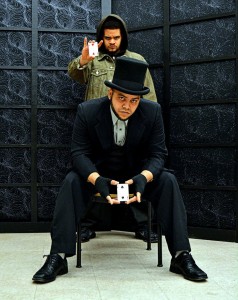 “Pick a black card, pick a loser” – Suzan-Lori Parks, Topdog/Underdog
“Pick a black card, pick a loser” – Suzan-Lori Parks, Topdog/Underdog
Topdog/Underdog has been described as a “postracial” play, but that moniker is purely academic. Suzan-Lori Parks’ story of two brothers who struggle against poverty, identity and each other necessarily uses race as a context, but not a crutch. Parks’ metaphors may be heavy-handed at times and the symbolism of Lincoln and Booth (“dad’s idea of a joke”) foreshadows the play’s conclusion from as far away as the parking lot, but none of that detracts from a story told well and a production mounted as successfully as Counter-Productions Theatre has managed in its second mainstage show of this season.
David Valentin’s Lincoln is the older sibling, unwillingly divorced and paying rent to his unemployed brother. A retired hustler, Lincoln now makes his money putting on whiteface and dressing up as his namesake at a sleazy arcade where tourists pay for the chance to shoot the former president dead again and again. Rudy Rudacious is Booth, who aspires to his brother’s former success at taking down marks and gets by via stealing what he needs to survive and hanging on to dreams of marriage to an unseen but aptly named Grace. The hustle is three card monte and Booth’s struggle to gain proficiency at the racket that nearly killed his older brother sets the stage for the struggle that ensues. Lincoln wants to remain straight, play by the rules and hold on to his job, even if that means humiliation and pay cuts. Booth insists that he be called “3-Card” going forward, and if his brother won’t join him, then he better step aside.
Stripped of any racial context, the play would still work well; one-room dramas live or die not only by the script but by the performances. Director Ted Clement has deftly staged a piece that could devolve into a lot of yelling and posturing, but instead revels in dynamics. Valentin’s grounded assurance is used as a counterpoint to Rudacious’ often carnal amplitude. Tensions simmer and reduce again and again and Clement’s staging wisely allows for just enough physicality to keep Topdog/Underdog from being simply just two-plus hours of verbal sparring. By the time we reach the inevitable conclusion, the audience has been put through the wringer only slightly less than Rudacious and Valentin, whose performances will be remembered as two of the more important ones of this season.
Clement’s set is wonderfully crafted, a one-room apartment with aging and unmatched furniture, some of it consisting of little more than junk. The personality of the room reflects a desire to recreate what little Booth can remember from their aborted childhood. Two milk crates and a slab of cardboard serve as dining room and bookshelf (“now we only need to get some books,” quips Lincoln, half-seriously), but Booth’s primary concern is having a spot for the photo album, the fragile repository of what limited memories they have of their parents before the boys were left to their own devices while barely out of adolescence. An unseen mirror downstage center allows for moments of revelation as each brother unselfconsciously delivers monologues of identity crisis. Sounds of arcades and childhood underscore memories and future wishes as we begin to realize that the hustle and the reality are harder to pick apart.
Topdog/Underdog is, in the end, a history play and the three revolving cards that Lincoln and Booth live by are tools of both the oppressor and the oppressed. For Booth, the black card is a loser while Lincoln, when he deals, chooses the opposite. It is a matter of perception, though, for the game is the same. No matter how hard you work to keep up, the game is fixed and you only win if the dealer allows it. The only way to win is not to play.
TOPDOG/UNDERDOG by Suzan-Lori Parks presented by Counter-Productions Theatre Company. Feb 27 – March 8. Performed at AS220’s Blackbox Theatre (formerly known as 95 Empire).


